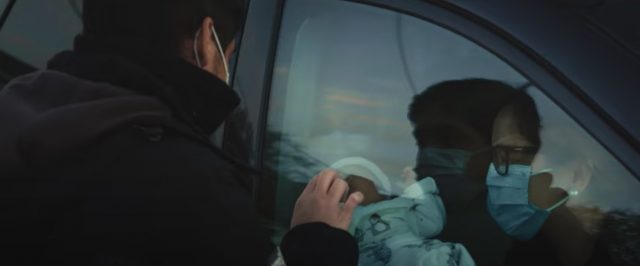The First Wave: Hero Worship, by David Bax

Matthew Heineman’s The First Wave has a title with a very specific meaning; it refers to the first four months of the COVID-19 pandemic in New York City. But that might not be obvious to someone who hasn’t yet seen the film. Depending on where in the world you live, how tight restrictions were in your city or town, how closely you heeded medical advice and safe practices and a thousand other things, what constitutes the “first wave” of this ongoing pandemic could differ from person to person. Which raises the question, is it too soon for us to be memorializing an event so sprawling and chaotic that we still don’t have a grip on it? This thing has outlasted the political career of the New York governor whose briefings we see throughout the film. How can Heineman’s documentary be anything more than a flicker of a light bulb in the midst of a hurricane?
Furthermore, what to make of Heineman’s journalistic efforts? In crafting a movie that goes out of its way to illustrate how dangerous this virus is, it’s hard not to judge the director for hanging around in other people’s homes or lingering, inessentially, in hospital rooms and corridors. Now, none of this is what The First Wave, which is quite powerful, is actually about. But these are valid reservations that can’t help but play into one’s final estimation of the film.
Wisely, Heineman spends very little time reminiscing about early quarantine commonalities. There’s a little bit of the recognizable experience of learning how to use Zoom but, for the most part, The First Wave avoids being cutesy or nostalgic about a pandemic that’s still killing people.
Instead, the film zeros in on the very specific experience of New York City hospital workers at a time when the region was the hardest hit in the nation. You can’t laugh knowingly at shots of corpses being loaded onto emergency morgue trucks the way you might at some reference to Tiger King or sourdough starters. There’s no way to mitigate the awful solemnity of the minute of silence observed by hospital staff every time someone dies. Heineman never lets the full minute play out before cutting to another scene; the film would be too long by hours.
One thing that does feel soberingly familiar happens when The First Wave reaches May of 2020, when two months of empty streets suddenly ended in one massive gathering after another, people marching and protesting for justice, for the sanctity of Black lives and for an end to America’s long tradition of racist police brutality. Heineman doesn’t leave us guessing at the nature of his sympathies. He includes shot after shot of cops being violent toward peaceful protestors.
Stunningly, that’s not at odds with the fact that one of our main subjects is a cop, suffering for weeks on end in the hospital from a severe case of COVID-19. This is someone whose recovery we root for. The film’s opening scene is a raw and devastating moment of death; we are given no assurances that this man or anyone else will live. The commonality between these two looks at police officers is the presence of doctors. In the film’s most emotional segment, we watch a Black doctor talk down a young Black protestor whose pain has led him to abandon caution and put himself in the path of police violence. This is one of the same doctors who treats our ailing cop at work, spending her free time caring for people because that’s her mission, not just her job. The First Wave may be awkwardly inchoate as a document of this pandemic but, as a testament to those who serve to heal us, it’s indelible.





























